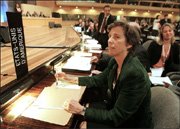
Read the full text of Ambassador Olivers address to UNESCO's Executive Board of October 3, 2006.
Excerpts from her address to the Board:
Mr. Director General, we do want to work with you, because we know how difficult it is to transform an intergovernmental organization like UNESCO into a revitalized, results-oriented institution. In order to be successful in this monumental task, we must all work together, with courage and persistence, as there are many pitfalls along the way that can derail the process of reform. This challenge is not for the faint-hearted, but fortunately we know that you, Mr. Director General, understand that despite all obstacles, UNESCO must continue to go down the path of reform if it is to become a more effective, influential, and respected member of the UN family.
In fact, since our return to UNESCO three years ago, the United States has observed that real progress has been made in a number of areas. Take literacy for example, an issue many countries have been working on for a long time. UNESCO can now support their efforts with an excellent literacy initiative that has the potential to improve the lives of millions of people, particularly women. Moreover, Mrs. Bush’s literacy conference has helped UNESCO gain heightened public recognition of its role as the UN’s lead agency for the Decade of Literacy. Mrs. Bush’s conference was designed to strengthen the international community’s political will that plays an essential part in the battle against illiteracy.......
The United States will actively support UNESCO’s regional meetings, as well as related programs in teacher training, gender parity, HIV-AIDS prevention, and reading materials and textbooks that emphasize tolerance and civic participation. UNESCO’s renewed focus on its educational initiatives, including its EFA Global Action Plan, sends a strong message to the international community that UNESCO has rededicated itself to its number one priority, education.
In order to achieve its goals, however, UNESCO’s Education Sector must have the skills, expertise, and resources that it needs, particularly in the field offices. We are confident that the new management plan will enable the Sector to strengthen the coherence of its programs, and will enhance accountability........
In both the public and private sectors, successful organizations constantly search for better and more cost-effective ways to conduct their business. In our view, the biggest challenge facing UNESCO is not the lack of resources, but the continued need for significant management and administrative reform. More funds for ineffective programs will simply produce more ineffective programs, and that will not help those countries and individuals that really need and deserve our assistance.
As we have said numerous times, UNESCO must focus on its priorities, and take full advantage of its multi-disciplinary organizational structure. Current programs should be evaluated to see if they are relevant and effective, and new initiatives supported only when it is clear that they are essential for the work of the organization. Furthermore, any new program should include a sunset clause that will automatically lead to the termination of that program unless there is a persuasive reason to have it renewed.
No comments:
Post a Comment